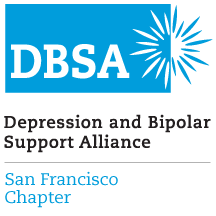BIPOLAR
What is Bipolar?
Bipolar is fairly common. About 1 in 100 people have bipolar disorder (formerly known as manic depression). We all likely know people who suffer from bipolar episodes. Here are helfpul ways to understand and manage bipolar.
What does it mean to have Bipolar?
People with bipolar experience extremes of energy and mood: manic episodes (bipolar I), hypomanic episodes (bipolar II) or cyclothymia. Mania includes at least 3 of the following symptoms for at least seven days: high distractibility, impulsivity, grandiosity, flight of ideas, agitation, no sleep, rapid pressured speech.
Hypomania means a less intense or a shorter episode (4 days or less).
Talking to peers can be greatly helpful. We've been there, we can help, join a support group.
How to Manage Bipolar?
In this video, you'll hear how a fellow peer with bipolar 1 has turned her diagnosis into a platform of hope, and has managed to stay symptom free for 17 years using: sleep management, medications, eating healthy, doctors, mindfulness, exercising, having a routine, tools, and building a support system.
Click to join a free peer-to-peer support group
Solving Bipolar
by Dr. Huberman,
Standord School of Medicine:
Start at 00:14:24 Prevalence & Severity of Bipolar Disorder
00:38:20 Consequences of Bipolar Disorder, Heritability
00:46:53 Bipolar Disorder vs. Borderline Personality Disorder
00:51:51 Negative Impacts
01:02:44 Lithium Treatment & Side-Effects
01:05:05 Effects of Lithium: BDNF, Anti-inflammatory & Neuroprotection
01:10:10 Neural Circuits of Bipolar Disorder, Interoception, Hyper- vs. Hypoactivity
01:17:11 Neural States & Mania, Parietal Lobe & Limbic System
01:22:58 Homeostatic Plasticity, Synaptic Scaling, Lithium & Ketamine
01:36:00 Talk Therapies: Cognitive Behavioral Therapy, Family-Focused Therapy, Interpersonal & Social Rhythm
01:43:18 Electroconvulsive Therapy (ECT), Transcranial Magnetic Stimulation (rTMS)
01:48:01 Psylocibin
01:51:50 Lifestyle Support, Supplements: Inositol & Omega-3 Fatty Acids
02:03:31 Omega-3s, Membrane Fluidity & Neuroplasticity
02:06:44 Mania, Creativity & Occupations
02:15:33 Bipolar Disorder: Diagnosis, Neural Circuits & Treatment.
